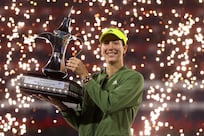Trying to make a career in comedy used to mean slogging around dive bars with little more than a pocketful of loose change and a headful of jokes. Any kind of audience was a bonus. The situation is slightly different these days. With a laptop and an internet connection, you can reach millions of people without even leaving the house – that said, though, you do still need a headful of jokes.
Raba Khan has all of these things. The 20-year-old from Dhaka in Bangladesh began posting amusing statuses, affectionately mocking Bengali culture, on her Facebook page a few years ago. It was just meant to be a bit of fun, really. But when they began to be shared many thousands of times, Khan decided to try making comedy videos, which she uploaded to YouTube.
Today, her YouTube channel, The Jhakanaka Project, has nearly 180,000 subscribers. But the number of people who have actually seen Khan's videos, a mix of pin-sharp observations and first-rate impressions in English and Bangla, dwarfs this figure. "10 Bangla Songs on One Beat" (2.1 million views); "Types of Bengalis in Restaurants" (1.1 million views); "Stuff Bengali Girlfriends Say" (419,000 views). Instagram, Snapchat, Twitter – if there's a social network out there, you can be pretty sure Khan is in the process of conquering it. Oh, and she now has her own clothing line as well.
"I was always the extra-curricular kid at school, who wanted to sing and dance, anything that wasn't studying," Khan told me, ahead of her appearance earlier this month at Dhaka Lit Fest. "And then at some point, my friends said, 'OK, you're funny, I think you should do something about it.' It's been life-changing. I never knew I could do it but once I started, I just didn't stop."
Khan’s decision to have a crack at comedy – the most unforgiving of art-forms – is all the more remarkable given how small the comedy community in Bangladesh currently is.
There are one or two names you might have heard of – Hanif Sanket, perhaps, or Naveed Mahbub – but comedy lags some way behind music, art and literature in Bangladesh’s cultural consciousness. The live stand-up scene in Dhaka is almost non-existent.
“It’s been difficult because I really didn’t have anybody I could look up to and be like, ‘Oh this person is doing working like this. That’s the path I should be following.’ I just never had that,” says Khan. “I didn’t even know if this was something people would accept.”
That final statement needs a little more unpicking. By “this”, Khan means “a female comedian”. Depressingly – though perhaps inevitably – her gender matters. “In Bangladeshi society, or in south Asia generally, women feel like they will not be desirable if they’re funny,” she says. “It’s not something people expect women to be. If I’m goofy, guys aren’t going to be like, ‘Oh yeah, let’s date this person.’ That’s why a lot of people don’t do comedy, even if they’re really, really funny.”
Discussions like the one held at Dhaka Lit Fest – "Women and Wit" – are helping to change this frankly absurd perception but it's going to require a Dhaka traffic-jam full of people as bold as Khan to really make a difference.
And then there’s one thing those old-school comedians on the stand-up circuit never had to endure: trolls. Hecklers, maybe, but not ones spitting the sort of venom Khan has to deal with. “Social media is a place where you just need to be so thick-skinned,” she says. “It’s very difficult and a lot of people aren’t ready for that.
“Men are criticised online, as well as women. I just feel like whatever hate I’ve had up to this point has been about the way I look, it’s never about the comedy.” This seems unbearably bleak but Khan then adds: “And therefore it’s irrelevant. I don’t care about it.”
Put like that, it seems kind of simple. It isn’t, of course, and Khan, for all her own confidence, appreciates the impact remarks about one’s appearance can have. But she is also right: if you want to be a comedian, what really matters are the jokes. And the millions and millions of people who watch Khan’s videos would agree that she’s pretty good at those.
_____________
Read more:
Nandita Das: it is time to own the term 'female director'
Comedian Dave Chappelle returns for Dubai gig – but no phones allowed
_____________











